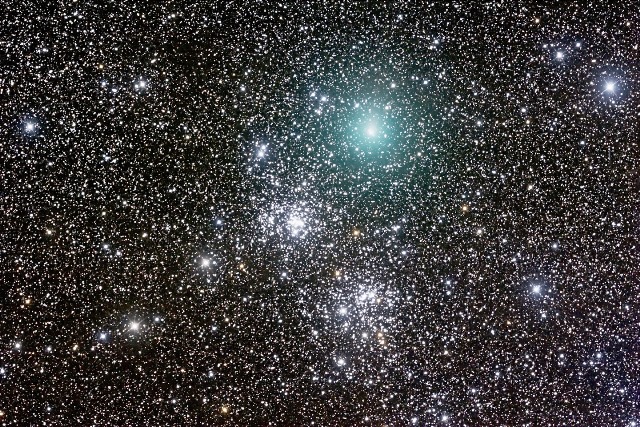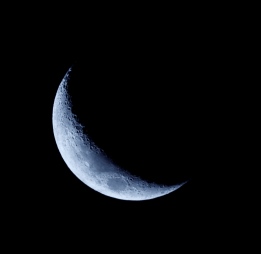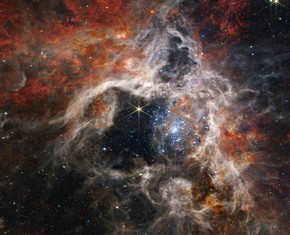The views expressed in our content reflect individual perspectives and do not represent the authoritative views of the Baha'i Faith.
This was a direct quote from Dr. Carey Murphy during a Science and Religion session she led at Bosch Baha’i School in Santa Cruz, CA.
I think she’s right on several levels. In mundane terms, our exploration of the Universe is about light. It is because of light that we can study other planets, stars, galaxies and other structures in our universe. Radiant light allows us to see stars and nebulae; reflected light allows us to see bodies that are not, themselves, light sources.
And that got me to thinking about albedo (the reflective capacity of a surface) and inference and how we know something exists. In this case, the “something” is God, who is often likened to the Sun in the scripture of the world’s revealed religion—that is, a source of light.
In the physical Universe, we can detect the presence of a light source and even know something about its power by observing its reflection on a non-light-emitting body such as a planet, moon or asteroid.
 It’s not immediately apparent when you look up at the moon at night that the source of the brilliant light that bathes it is from another source (the Sun) that cannot be seen. Historically, it took observation and reasoning to bring early scientists to the conclusion that the moon was bright because it was reflecting the light of the Sun hidden from sight by the Earth. In a word, inference. We could infer the existence of the Sun because it was reflected on another celestial body.
It’s not immediately apparent when you look up at the moon at night that the source of the brilliant light that bathes it is from another source (the Sun) that cannot be seen. Historically, it took observation and reasoning to bring early scientists to the conclusion that the moon was bright because it was reflecting the light of the Sun hidden from sight by the Earth. In a word, inference. We could infer the existence of the Sun because it was reflected on another celestial body.
Human beings have a reflective capacity (aptly named) that differentiates them from other animals. This capacity allows human beings to wonder why the moon is bright when the sky around it is dark, and further to make the observations, do the reasoning, calculate the mathematics, and imagine, design and build the tools necessary to study the phenomenon of reflected light.
The question is: what “light source” is it that the human reflective capacity, itself, reflects?
Let’s approach this from a slightly different angle. Richard Dawkins states that
“Nature is not cruel, only pitilessly indifferent. …neither cruel nor kind, but simply callous: indifferent to all suffering, lacking all purpose… The universe that we observe has precisely the properties we would except if there is, at the bottom, no design, no purpose, no evil and no good, nothing but pitiless indifference.” (The God Delusion, 1995)
He’s right—nature is all of those things. We see this reflected in the physical aspects of nature and natural entities—including humans. Which begs the question: If nature emanates only callous, pitiless indifference, whence the human capacity to reflect empathy, selflessness, curiosity sufficient to drive discovery, invention, imagination?
What is the source of intellectual, spiritual and moral “light” that the human reflective capacity or intellect reflects when it insists on justice or mercy; when it conjures abstract concepts such as mathematics, poetry, music, philosophy; when it insists that its young learn to reflect those abstracts as well?
This source of light, according to the scriptures of the world’s revealed religions, is what we call God.
Just as different spatial bodies possess different capacities to reflect the light of their respective stars, human beings possess different “albedos”—different capacities to reflect the above-mentioned qualities. Which, to me, explains much about the state of the world. We—uniquely in nature—have a choice about whether we want to reflect “pitiless indifference” or something else—something not found in nature.
One of my favorite quotes about science is from Lord Kelvin:
 “Do not be afraid of being free thinkers. If you think strongly enough you will be forced by science to the belief in God, which is the foundation of all Religion. You will find science not antagonistic, but helpful to Religion.”
“Do not be afraid of being free thinkers. If you think strongly enough you will be forced by science to the belief in God, which is the foundation of all Religion. You will find science not antagonistic, but helpful to Religion.”
The scriptures of the Baha’i Faith agree, taking the reflection metaphor further:
“Science is an effulgence of the Sun of Reality, the power of investigating and discovering the verities of the universe, the means by which man finds a pathway to God.” — Abdu’l-Baha
At one time, we looked at the moon and believed that it generated its own light. As we came to know more about reality, we realized that was not the case—the moon was reflecting the light of the real source. Our knowledge about the physical universe evolved and we were able to move onward and upward in our journey of discovery.
It stands to reason that this is true of intellectual and spiritual reality as well.
You May Also Like
Comments

















"What is the source of intellectual, spiritual and moral “dark” that the human reflective capacity or intellect reflects when it insists on injustice or revenge; when it conjures abstract concepts such as covetousness, greed, profanity, self-gratification; when it insists that its young learn to reflect those abstracts as well?"
Attributeless God commands the creation of the infinitely attributed Primal Point. That Primal Will, in turn, decreeing “Let there be phôtons” is equivalent to It decreeing “Let there be skotádons.”
...
The creation of attributes requires a gamut of potential manifestation of those attributes--from none to all. Hence, from dark to bright.
Therefore. choosing hatred is as much a proof of the existence of God as choosing love. It is the potential of choice which is the proof. As Emeritus Professor Richard Dawkins pointed out, nature lacks the ability to choose.
I think many people read that passage and (in part because it's divided up strangely in most Bibles) and take it as a string of random images—fish, stones, snakes, gates, roads and fruit—and fail to put the entire context together. What Christ does here is give a lesson in deductive reasoning.